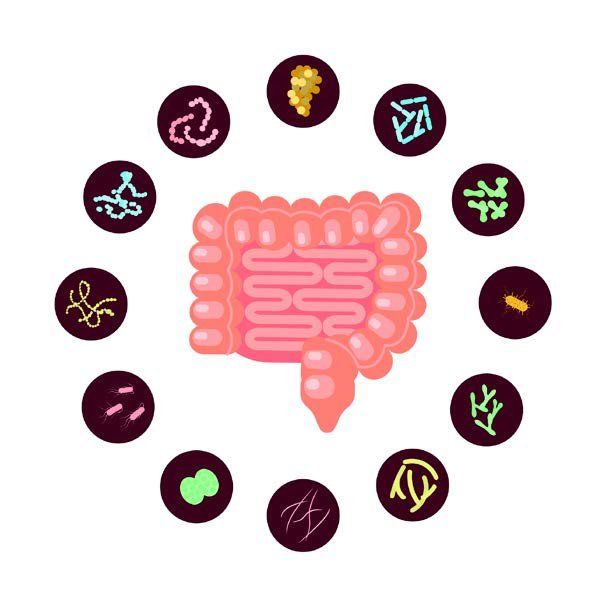As we age, the strength and size of our muscles tend to decrease. This loss of muscle mass and function, called sarcopenia, is associated with decreased independence and reduced quality of life. Staying active (and purposefully incorporating muscle-strengthening exercises) is essential, but emerging data suggest that nourishing our gut microbes could be important as well.
The Gut-Muscle Connection: The trillions of bacteria and other microbes that live in our guts are intimately intertwined with our metabolism. These microscopic inhabitants play roles in digestion, nutrient absorption, and amino acid synthesis, and are also involved in maintaining the integrity of the intestinal lining so invading organisms, unwanted food components, and the wrong microbial products cannot slip through. Studying the role of the gut microbiome in health is challenging, but research suggests that the make-up of our personal inner world of tiny organisms could play a role in our risk for a number of common diseases and conditions, including obesity, diabetes, and cardiovascular disease. “Emerging research in mice and preliminary human studies suggest there may also be a connection between our gut microbiome and our muscles,” says Michael Lustgarten, PhD, a scientist in the Nutrition, Exercise Physiology, and Sarcopenia laboratory at the Human Nutrition Research Center on Aging.
One factor believed to contribute to sarcopenia is the level of general inflammation in the body, which increases with age. Scientists have found changes in the gut microbiota in older adults that could cause the intestinal walls to become more permeable, allowing inflammation-promoting factors to enter circulation. In other words, age-related changes in the gut microbiome could lead to increased inflammation, which in turn may contribute to loss of muscle. Change in muscle composition (fat building up in muscle tissue) has also been implicated in loss of strength and function with age. Studies in rodents and pigs suggest several pathways by which gut bacteria may influence the change in muscle composition.
Lustgarten and his colleagues are currently conducting research to gather more information on the gut-muscle connection. “I see promising data emerging from the human studies that are underway. We need additional studies to provide more information and, ideally, to prove cause and effect,” says Lustgarten.

Image © bsd555 | Getty Images
A Role for Diet: Our dietary intake can impact the make-up of our gut microbiome. Foods with live cultures, such as many yogurts, contribute live bacteria that help populate the gut. Fermented foods, including hard cheese and kambucha tea, also contain live organisms (as long as they have not been heat treated). Naturally fiber-rich foods are a key component of gut-microbe-supporting dietary patterns. Fibers are prebiotics, compounds that nourish microorganisms. Because they cannot be broken down by digestion, fibers reach the lower intestines intact, where they serve as food for gut bacteria. Several studies have demonstrated that feeding prebiotic fibers to mice alters the gut microbiota in ways that decrease inflammation and potentially protects against age-related muscle atrophy. A 2009 study in the journal Gut reported an increase in muscle mass in obese mice fed the prebiotic fiber oligofructose (which is found naturally in foods such as bananas, onions, garlic, asparagus, wheat, and barley). Note that added fibers may not have the same general health benefits as the fibers found naturally in whole foods, and many foods with added fiber may also have high levels of added sugar and/or sodium.
It’s important to keep in mind that most research on the gut-muscle connection has been done in mice, rats, and pigs. The results may not translate to humans and do not prove cause and effect, but they open the door to the exciting idea that diet could someday be used to slow the aging process by altering the composition of gut bacteria. A dietary pattern high in naturally high-fiber foods (and low in highly-processed refined foods) has many known health benefits—now we can add the possibility that it may even help keep us strong and fit.
Follow these tips to preserve muscle with age:
-ADD STRENGTH TRAINING using weights,machines, or your own body weightat leasttwo days a week.
-BE GENERALLY ACTIVE, whether by walking,dancing, working, or playing, to keep thosemuscles moving.
-CHOOSE HIGH-FIBER FOODS like fruits,vegetables, legumes, and whole grains. Thesefoods have health benefits in their own right,and help maintain healthy gut microbes whichmay play a role in muscle structure and function.






















At the age of 88 I can still lift a 50# bale of hay, and heave it! I spade the garden, shovel snow, make quilts. (It takes a bit of push to force needles through several layers of fabric.) I put 20,000 miles a year onto my cars, and get up in the morning proving that I am an active believer that it is more productive to raise daisies than it is to push them up! If you don’t believe ask my daughter, Dr. Harmony Allison who is a Gastroenterologist, and a professor on your staff.
Good for you, Dana Allison!! Clearly a rural life. How have you avoided the chemical toxins of farm life?
good gut article. 86 heathy but becoming more food intolerant resulting in only chest Rash,,,, no doctor can help me.
is it useful to take probiotic supplements?
Yes, it is helpful; and be consistent with it if you want them (the organisms) to stick around for a while. But make sure to always eat some type of probiotic food: kimchi and sauerkraut are good. Drinks: kefir and kombucha top the list. -Craig
Excellent information . . . thanks for sharing. Keep the information coming. At age 89 I cannot lift a 50# bale of hay, but hope to get there with guidance such as yours! I do get activity with muscles at least twice a week and walk about 2-3 miles daily. But can always benefit by more information regarding food choices. Do not eat processed foods.
I’m only 72 but love getting the expert information and guidance from Tufts — and following it! What an inspiration these comments have been!
Robin Hatzenbuehler
Gary Strunk I’m enjoying your lifting 50# bale of hay. At 86, I can still lift 100 lb. sack of feed on and off the truck. Been a vegetarian for 60 years. Wt. training twice a week. Gut microbiota is the next great frontier for over all health. thanks for these articles.